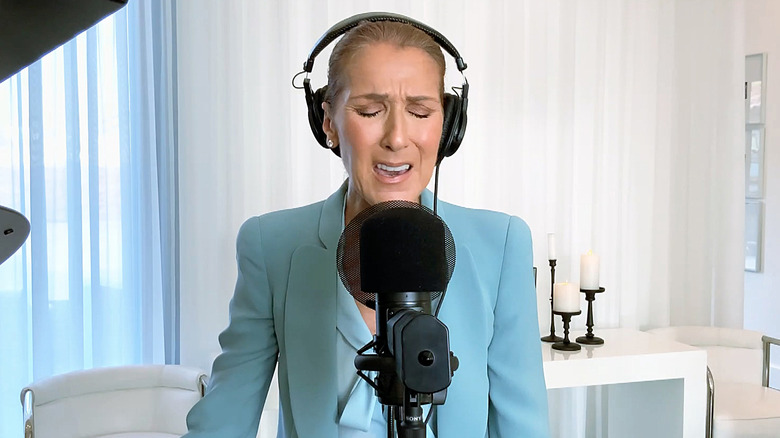Stiff Person Syndrome: Everything You Need To Know About The Rare Autoimmune Disease That Ended Celine Dion's Career
In 2022, Céline Dion received a heartbreaking diagnosis: She has stiff person syndrome (SPS). Dion is one of an estimated 8,000 people globally who have been diagnosed with this incredibly rare autoimmune neurological disease. Cleveland Clinic notes that around one in every 1 million people have SPS.
If you've never heard of SPS, you're not alone. It's not a disease that's talked about that much because it affects such a small number of people. Those with SPS deal with stiffness in their joints and muscles and experience muscle spasms, which can become pretty severe. Some with the disease inevitably lose their mobility. SPS usually affects the torso first, causing muscle stiffness in that area. This can eventually spread to the legs and arms, making walking and balancing hard, which often leads to injuries from falls. Dion has experienced all of these symptoms, and they have spread throughout her body — including her vocal cords. "Unfortunately, these spasms affect every aspect of my daily life, sometimes causing difficulties when I walk and not allowing me to use my vocal cords to sing the way I used to," she said in a video she posted about her diagnosis.
Dion has undoubtedly raised awareness surrounding this uncommon disorder and her own experiences. That said, there are still many fans who have questions about the disease and how the powerhouse singer has been doing. Here's what we know about SPS.
Celine Dion hid her disease from the public in the beginning
When Céline Dion first got diagnosed with stiff person syndrome, she hid it from fans and the public for quite a while — and we don't blame her. Being diagnosed with a rare autoimmune disease can be tremendously upsetting, and finding a treatment plan can be challenging since it differs for each person. That means patients often have to endure various doctor's visits before they finally find medication that works to alleviate some of their symptoms.
In late 2022, Dion was ready to share her health news with her fans. In a YouTube video, she confirmed she'd been dealing with a health crisis. "I wasn't ready to say anything before, but I'm ready now," she said, before announcing her diagnosis. "We now know that this has been causing all the spasms I've been having," she explained. She then proceeded to tell fans that she had to cancel her upcoming tours. She assured them that she had a great medical team and was working hard to get better in order to return to the stage as soon as possible. "All I know is singing. It's what I've known all my life. And it's what I love to do the most," she said, blinking back tears.
While the legendary singer has had to step back from singing, her love for her fans is unwavering. When Céline Dion made a surprise appearance at the 2024 Grammys, she expressed how much it meant to be there and feel the support of the audience.
Stiff person syndrome has no cure
Like many other autoimmune diseases, stiff person syndrome cannot be cured — yet. And more research is needed to improve current treatments. "Treatments aren't terribly effective, so oftentimes when patients present with stiff person syndrome, the natural history of the disease is that it continues to progress," Richard Nash, M.D., told Scripps News, adding that Dion's openness about the disease has directed a lot of new attention to it. He also mentioned that doctors are looking into the efficacy of stem cell transplants to help ease symptoms of SPS. A 2024 study published in the journal of Neuroimmunology & Neuroinflammation found that patients with SPS who received a stem cell transplant showed an improvement in symptoms, including their ability to walk and their levels of muscle stiffness. Nash, who part of this study, stated that while the results are promising, there are some risks associated with this treatment.
While doctors are trying to figure out how best to treat (and possibly cure SPS), Céline Dion has accepted her diagnosis and is trying her best to stay optimistic. "I haven't beat the disease, as it's still within me and always will be. I hope that we'll find a miracle, a way to cure it with scientific research, but for now I have to learn to live with it," she told Vogue France. She also told the BBC that she's planning on raising funds for SPS research and creating awareness around the disease.
There are different types of stiff person syndrome
Aside from being challenging to treat, there are also different types of stiff person syndrome. Classic stiff person syndrome, which is what Céline Dion likely has, is the most common among the different types of SPS. This type of SPS is thought to be primarily caused by glutamic acid decarboxylase (GAD) antibodies, according to Cleveland Clinic. However, studies have found that other antibodies might also be responsible, so this is not set in stone. Aside from classic SPS, there are also SPS variants, which only affect certain areas in the body or a person's coordination abilities. One of these variants is known as ataxia, which can affect the body in different ways, most notably how the brain perceives the body in space, causing clumsiness and incoordination. Cleveland Clinic notes that, depending on the cause, ataxia can sometimes be reversed.
The third type of SPS is Progressive encephalomyelitis with rigidity and myoclonus (PERM), which is about as bad as it sounds. It's a severe form of SPS that exacerbates the symptoms associated with general SPS. Patients with this variant of the disease typically find that they have trouble moving their eyes, suffer from ataxia, and experience periods of unconsciousness. These patients usually need to be hospitalized.
The symptoms of stiff person syndrome are debilitating
In Céline Dion's documentary "I Am: Céline Dion," she bares all about her journey with stiff person syndrome, including showing raw footage of her experiencing an extreme muscle spasm. Though this is hard to watch, it sheds light on what patients with this disease go through in their daily lives. In the footage, Dion is with her physical therapist, and while they are working, she starts to experience cramping in her foot. The spasm quickly progresses and eventually her entire body is spasming, so much so that Dion can't speak. Her therapist turns her onto her side as the spasm continues, and she stares out in front of her helplessly, tears running down her face.
Cleveland Clinic notes that, aside from experiencing rigidity and muscle stiffness, SPS patients often also deal with the muscle spasms we see Dion endure in her documentary. The stiffness people experience is painful already, with the outlet describing it as "pain and an aching discomfort." This can spread to the legs and arms, and as it permeates the body, patients often develop such abnormally poor posture that they can't move or walk normally. The muscle spasms, like the stiffness, can affect certain limbs and sometimes the entire body. They can last anything from a few seconds to a few hours. Dion's spasms, like the one shown in the documentary, sometimes lasts 30 minutes to an hour.
There are some medications that can help ease symptoms
While stiff person syndrome symptoms are no doubt debilitating, there are ways to manage them with certain medications. Johns Hopkins Medicine explains that drugs focused on relaxing the body's muscles are most commonly used to treat SPS. Diazepam, clonazepam, baclofen or tizanidine are some of the most commonly prescribed muscle relaxers. Botox, which surprisingly can be used to treat various health conditions, can also be administered to help treat areas where patients experience extreme spasms or tightness. Medications that affect the GABA neurotransmitter are also prescribed to treat SPS. Sometimes, doctors prescribe serotonin reuptake inhibitors (SSRIs) to patients whose anxiety triggers SPS symptoms. Immunotherapies can also be implemented to treat SPS patients. These medications work to inhibit the immune system to keep it from overreacting, thus diminishing symptoms of the disease.
During the harrowing scene in the "I Am: Céline Dion" documentary where the singer experiences a full-body spasm, one can see her doctor administering a nasal spray. Amanda Piquet, M.D., who also treats Céline Dion, later told Today that this medication was a benzodiazepine nasal spray, a depressant drug that targets anxiety and muscle spasms and as a result helps relieve SPS symptoms like extreme spasms.
Physical therapy and exercise is also used to treat the disease
Aside from various medications, stiff person syndrome is also treated with physical therapy and exercise, and patients might see additional improvement if they combine the two, according to Johns Hopkins Medicine. Popular exercises for SPS include stretching, Pilates, and yoga. Physical therapy includes heat therapies like aquatic therapy and heating pads, myofascial techniques, chiropractic treatments, osteopathic manipulation, massages, acupressure, acupuncture, transcutaneous electrical nerve stimulation, cognitive behavioral therapy, and qigong (an ancient Chinese practice where breath and movement are used to relieve pain and promote well-being).
Céline Dion has made it clear that she is determined to get better and has been going to regular physical therapy sessions to help her body deal with the disease. "The way I see it, I have two choices. Either I train like an athlete and work super hard, or I switch off and it's over," she told Vogue France. Of course, it's not in Dion's nature to do the latter, so she's been hard at work making her body strong. "Five days a week I undergo athletic, physical and vocal therapy. I work on my toes, my knees, my calves, my fingers, my singing, my voice, " Dion explained. "I have to learn to live with it now and stop questioning myself."
Certain things can trigger stiff person syndrome episodes
While the exact cause of stiff person syndrome is still up for debate, doctors have found that certain things can trigger this disease's symptoms. Many of these triggers are environmental and cannot be controlled by the patient. Cleveland Clinic notes that variations in temperature, loud or unexpected noises, and physical stimulation or touch can trigger SPS symptoms. Stressful situations are another trigger.
Excitement appears to be a trigger as well. If there's one thing to know about Céline Dion, it's that she's still as delighted about getting into the studio and singing her heart out today as she was when she first started her career. In her documentary "I Am: Céline Dion," the singer's physical therapist told her that her elation at singing earlier in the day was probably the reason she experienced an intense full-body spasm. Dion seemed miserable at the prospect. "If I can't get stimulated by what I love, then I'm going to go on stage, and you're going to put the pulse oximeter on me and turn me on my back?" she asked. Her physical therapist tried to reassure her. "It's scary, I know. It's hard. This is not the end of your journey."
Doctors still aren't sure what the cause of stiff person syndrome is
When Céline Dion was first diagnosed with stiff person syndrome, she was understandably blindsided. As she told Vogue France, "At the beginning I would ask myself: why me? How did this happen?" She still doesn't have answers to those questions, as there's no clear cause for stiff person syndrome.
Doctors believe it to be triggered by certain antibodies that attack glutamic acid decarboxylase (GAD). GAD is crucial for the body to function normally since it produces gamma-aminobutyric acid (GABA). GABA is a neurotransmitter responsible for controlling muscle movements. When antibodies attack it, this neurotransmitter's function is impaired, leading to the symptoms linked to SPS. And as Cleveland Clinic points out, GAD antibodies aren't solely responsible for SPS. Some patients with the disease have other antibodies related to the glycine receptor, dipeptidyl peptidase-like protein 6 (DPPX), and amphiphysin, so researchers are still trying to figure out why these different antibodies are present in different people with the same disease.
The real kicker is that some people with SPS don't have any of the above mentioned antibodies at all, which is still puzzling doctors, leading them to believe that there might be other types of antibodies responsible for SPS that haven't been discovered yet.
Some people are more likely to develop the disease than others
While the exact cause of stiff person syndrome remains unknown, Cleveland Clinic notes doctors have found certain people are more likely to develop the disease than others. Women are more often diagnosed with SPS than men. Those who have already been diagnosed with another type of autoimmune disease like celiac disease, thyroid disease, vitiligo, pernicious anemia, and type 1 diabetes are also at a higher risk of developing SPS.
There's no telling whether Céline Dion had any of the above mentioned conditions prior to her SPS diagnosis. In the past, fans were concerned about Dion's noticeable weight loss and whether it had something to do with health issues. The singer addressed the rumors on several occasions, telling ABC News in 2019 that people had nothing to worry about. "It's true that I'm a little thinner. Everything's fine. Nothing's wrong." Of course, by the time 2022 rolled around, Dion admitted that she'd been dealing with debilitating muscle spasms for some time and had to cancel some of her tour dates. "I was really hoping that I'd be good to go by now, but I suppose I just have to be more patient and follow the regimen that my doctors are prescribing," she said in a statement on her website.
Several tests are needed to diagnose stiff person syndrome
Diagnosing stiff person syndrome isn't exactly a simple process. Several tests are needed for doctors to rule out other medical conditions before an SPS diagnosis can be made. Johns Hopkins Medicine explains that blood tests, electromyography (EMG), lumbar punctures, and imaging studies are often used in tandem to diagnose SPS.
Blood tests are primarily done to determine whether the body is making anti-Gad65 antibodies. These antibodies are the most common indicator of SPS and high numbers are present in around 80% of patients who get diagnosed with SPS. Blood work can also determine whether other, less common antibodies associated with the condition are present, like amphiphysin and glycine receptor antibodies. An EMG, on the other hand, assesses muscle and nerve function, which can help doctors determine whether a patient has SPS. Lumbar punctures can also be used to determine whether anti-GAD65 antibodies are present and can help rule out other health conditions. Imaging studies look at the spinal cord, nerves, and brain and are primarily performed to ensure that patients don't have another underlying condition like cancer.
Céline Dion likely had many or all of these tests done while her doctors were trying to get to the root of her symptoms. She told Vogue that she had to get numerous checkups and went through the cumbersome process of elimination before finally getting her diagnosis.
Stiff person syndrome often goes undiagnosed for years
Stiff person syndrome often takes years to diagnose. Cleveland Clinic notes that SPS often presents the same symptoms as other conditions, like multiple sclerosis, ankylosing, and spondylitis.
Céline Dion knows the grueling diagnosis process all too well. For years, she had symptoms she couldn't explain, starting with her vocal cords spasming when she hit those signature high notes. She went to see a doctor immediately. "They looked at [my vocal cords] from every angle, and they said it was pristine," Dion told Vogue France. So she continued her Las Vegas residency and five tours. It was while she continued pushing herself amid her existing symptoms that she also occasionally started having difficulty walking. "I was holding on to things," she recalled. When the pandemic hit, Dion knew she had to find answers. She underwent several tests as doctors tried to eliminate every possible condition she could have. Finally, they figured out that SPS was the cause of her symptoms.
"It probably sounds very strange to say this to you, but when I was diagnosed, I was happy. I was finally able to move with the wave, not against it," Dion admitted. She also revealed that, by the time she got diagnosed, she'd been dealing with various symptoms of SPS for 17 years.
Living with stiff person syndrome can be incredibly challenging
Most stars who have been open about their health issues have one thing in common: they're all pretty candid about how challenging it is to live with their respective conditions. The results of treatment depends on the individual, and even when a customized treatment plan is in place, those with stiff person syndrome typically still experience muscle spasms that are triggered by factors out of their control. Cleveland Clinic notes that many patients start to experience mobility issues as the disease progresses, making walking and doing everyday tasks challenging. Many patients end up walking with a cane, walker, or are wheelchair bound. These physical limitations combined with the pain and discomfort from muscle stiffness and spasms can lead to mental health issues.
In her documentary "I Am: Céline Dion," the singer doesn't hold back when it comes to sharing how debilitating her disease is. "It's not a quick thing and there is no quick fix to what I've gone through," Céline Dion told Vogue France. "It's not just about vocal exercising and doing Pilates. It's rehabilitation physically and vocally, emotionally and spiritually—the whole shebang." She also admitted that her diagnosis has been "a big burden on my shoulders" but that sharing her story with the world has lightened the load, explaining, "Now I can just focus on reality. That's wonderful. My happiness came back."












